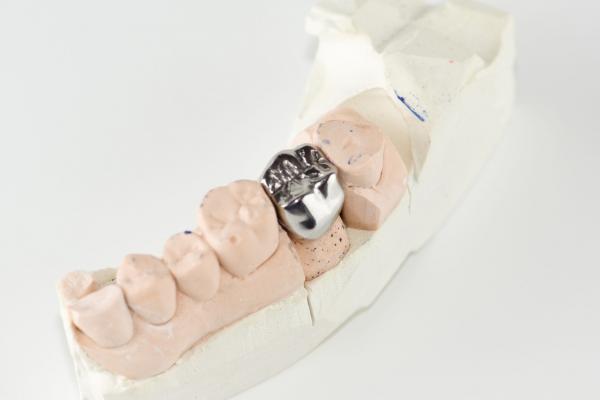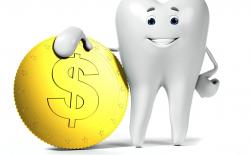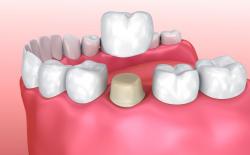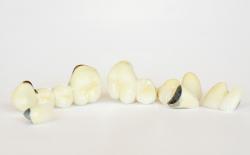What are the advantages of metal crowns?
If compared to the other crown types, a minimal amount of tooth structure has to be removed, and wearing out of adjacent teeth is also minimal.
Since these crowns are made of metals, they can withstand chewing and biting forces well and last for over a very long period. They hardly break or chip off.
- The most significant advantage of metal crowns is their tremendous strength.
- Crowns made completely of gold are of very good quality.
- Metal crowns cause minimal wearing of the surrounding teeth as compared to other materials.
- Metal crowns require a very little amount of trimming of the tooth.
- Metal crowns last for a very long period and resist chipping and breaking better than other types of crowns.
- They are very durable and are used for the restoration of teeth that are not visible, usually molar teeth.
- These are best suitable for patients who have strong chewing habits and are likely to clench and grind their teeth often.
What are the disadvantages of metal crowns?
The key drawback of metal crowns is their metallic color. They are best suited for restoring hidden molars.
For front tooth restorations, porcelain fused to metal (PFM) or all-porcelain crowns are recommended. Even for back tooth restoration, patients prefer PFM crowns instead of metal crowns.
A short video comparing metal and ceramic crowns. Duration: 1:55.
What is a porcelain fused to metal crown?
Metal crowns are sometimes prepared with porcelain fused to them and are referred to as porcelain fused to metal crowns (PFM).
They have a strong metal core on the inside and then a layer of porcelain is fused on it. They are as strong as a metal crown but because of the porcelain fusing, they look a lot more natural.
PFM crowns have been very popular, they are still widely used today, but nowadays ceramic crowns are usually preferred for front teeth restorations.
What are the advantages of PFM crowns?
- In the case of purely metal crowns, the metallic shine is a drawback but here the shade exactly matches the shade of the patient's tooth.
- Unlike the all-metal crowns, PFM crowns can be easily used on a tooth that is visible.
- The quality of these crowns is very durable and superior as they have metal in their core-shell.
- They have enough strength, are highly durable, and can easily bear strong chewing forces.
What are the disadvantages of PFM crowns?
- These porcelain crowns can cause wear and tear of the surrounding teeth causing pain and infections.
- More vulnerable to breaking and chipping than all-metal crowns.
- Since the porcelain covering is translucent, it sometimes makes the underlying metal visible which can be embarrassing for the patient.
- In case the gums recede, problems at the gum line of the crown may arise.
A video about porcelain fused to metal crowns. Duration: 1:41.
How does the procedure look like?
Metal crowns are fixed in the same way as most other traditional crowns:
- It requires two successive visits to the dentist to get them permanently fixed.
- On the first visit, a number of X-rays of the concerned tooth are done, and then it is numbed.
- All decay is cleared and then an impression of the teeth is taken.
- The impression is sent to a dental lab where a technician prepares your crown.
- While the permanent crown is being prepared, a temporary crown is placed on the tooth to protect it.
- After the permanent crown has arrived, it is cemented to the tooth permanently.
Metal crowns have great physical properties, but their esthetics is... limited.

How much does a metal crown cost?
The price of a full metal crown in the US usually starts around $650 and can go up to $1,300 or more.
However, you might want to consider gold or porcelain fused to metal crown instead of a full metal crown.
However, these crowns are usually at least $100 - $200 more expensive than metal crowns.
Captek is also a great alternative to metal crowns, even though this is usually more expensive than the ones mentioned above.
Need a local dentist?
You might also be interested in:
Dental Crowns Cost
The price of a dental crown depends on many factors. Read our article to find out more about what affects the cost of a dental crown.
How Long Do Dental Crowns Last?
Dental crowns usually last for about 5-15 years, however, in certain cases they can last a lot more.
Porcelain Fused to Metal Crowns
Porcelain fused to high noble metal crown is a good alternative to a pure gold crown. This crown has many of the benefits of a gold crown but looks more esthetic.


